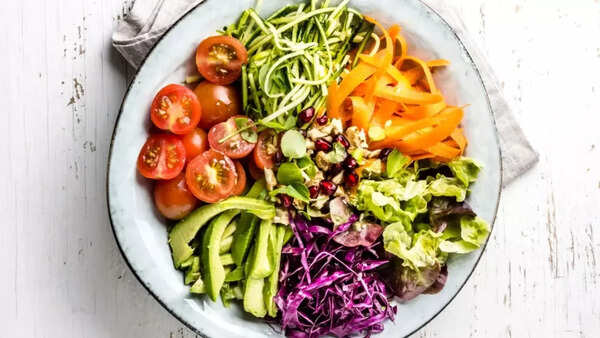A recent study has revealed that a low-fat vegan diet is even more effective than the widely praised Mediterranean diet in reducing the risk of diabetes and promoting weight loss.

The research, conducted by the Physicians Committee for Responsible Medicine and published in Frontiers in Nutrition, indicates that a vegan diet significantly lowers dietary acid load, a critical factor associated with weight gain and diabetes.
The study centered on the impact of a low-fat vegan diet on dietary acid load compared to the Mediterranean diet. Results showed a significant decrease in dietary acid load among participants following the vegan diet, coupled with notable weight loss.

Dr. Hana Kahleova, lead author of the study and director of clinical research at the Physicians Committee, explained, "Consuming acid-producing foods like meat, eggs, and dairy can elevate dietary acid load, leading to inflammation and subsequent weight gain. Replacing these animal products with alkaline plant-based foods such as leafy greens, berries, and legumes can aid weight loss and foster a healthy gut microbiome."
Researchers conducted a randomized crossover trial involving 62 overweight adults to investigate the link between a vegan diet and diabetes risk reduction. Participants adhered to both a low-fat vegan diet and a Mediterranean diet, each for 16 weeks, separated by a four-week washout period.
Dietary acid load was assessed using Potential Renal Acid Load (PRAL) and Net Endogenous Acid Production (NEAP) scores, with higher scores indicating a greater acid load.

The study revealed that animal products contribute to increased acid production in the body, leading to a higher dietary acid load and chronic inflammation, potentially disrupting metabolism and promoting weight gain.
Conversely, plant-based diets, being more alkaline, were associated with weight loss, improved insulin sensitivity, and reduced blood pressure.
Both PRAL and NEAP scores significantly decreased in participants on the vegan diet, while no significant change was observed on the Mediterranean diet. This reduction in dietary acid load correlated with weight loss, with participants on the vegan diet experiencing an average weight loss of 13.2 pounds, compared to no change on the Mediterranean diet.
The researchers attribute the weight loss benefits of the vegan diet to its alkalizing effect, which increases the body's pH level, making it less acidic. Foods that contribute to this alkalizing effect include:
Newer articles
Older articles
 Gavaskar Calls for Kuldeep Yadav's Inclusion in Second Test Amid Bumrah Fitness Concerns, Cites Edgbaston Spin Advantage
Gavaskar Calls for Kuldeep Yadav's Inclusion in Second Test Amid Bumrah Fitness Concerns, Cites Edgbaston Spin Advantage
 Indian Astronaut Shukla Arrives at ISS, Ushering in New Era for Space Program
OR
India Celebrates as Shukla Reaches ISS, Advancing Ambitious Space Goals
Indian Astronaut Shukla Arrives at ISS, Ushering in New Era for Space Program
OR
India Celebrates as Shukla Reaches ISS, Advancing Ambitious Space Goals
 Rishabh Pant Revolutionizing Cricket, Says Greg Chappell
Rishabh Pant Revolutionizing Cricket, Says Greg Chappell
 Toxic Workplace Warning Signs: Spot the Red Flags Early
Toxic Workplace Warning Signs: Spot the Red Flags Early
 Global Immunization Crisis: Millions of Children at Risk as Vaccine Coverage Lags, Study Reveals
Global Immunization Crisis: Millions of Children at Risk as Vaccine Coverage Lags, Study Reveals
 Moto G54 Price Slashed in India: Check Out the Discounted Rates and Specs
Moto G54 Price Slashed in India: Check Out the Discounted Rates and Specs
 Indian Cricket Star Mukesh Kumar and Wife Divya Singh Announce the Arrival of Baby Boy
Indian Cricket Star Mukesh Kumar and Wife Divya Singh Announce the Arrival of Baby Boy
 IRCTC Launches AI Chatbot 'AskDisha 2.0' to Revolutionize Train Ticket Booking and Customer Service
IRCTC Launches AI Chatbot 'AskDisha 2.0' to Revolutionize Train Ticket Booking and Customer Service
 Cummins Lauds Australia's Dominant Start to WTC Campaign After West Indies Series Win
Cummins Lauds Australia's Dominant Start to WTC Campaign After West Indies Series Win
 Smith Targets Test Return After Innovative Baseball Cage Rehab in New York
Smith Targets Test Return After Innovative Baseball Cage Rehab in New York